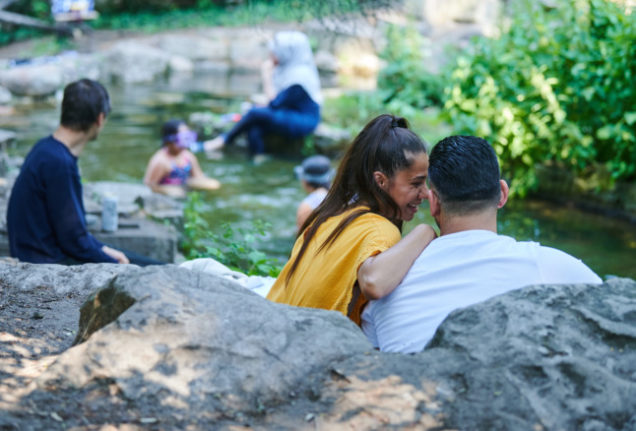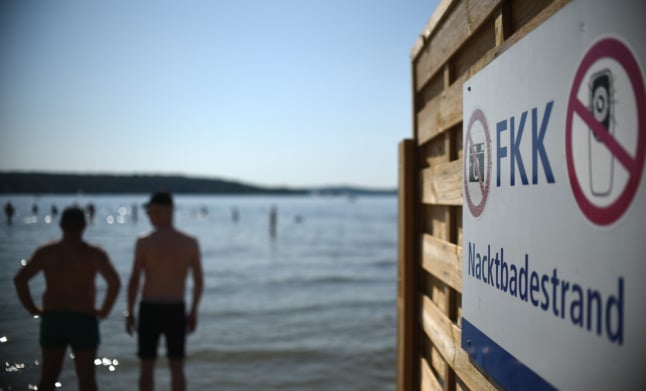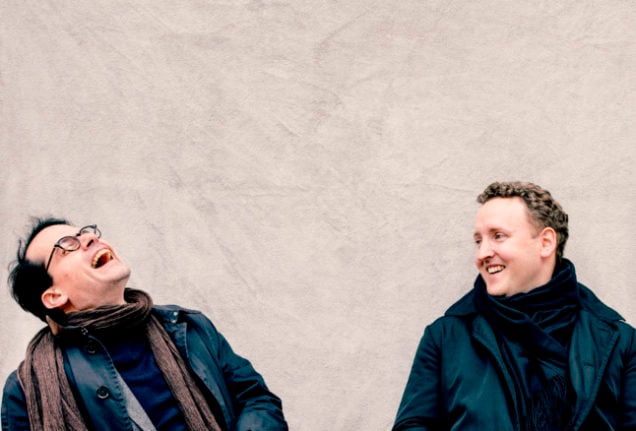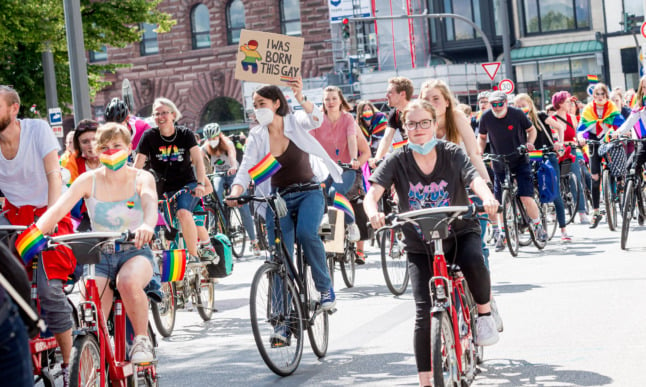Eight aspects of German culture foreigners should embrace

You might not have thought about adopting a German lifestyle to improve your habits, but you should. Take a look at these eight things that Germans do well - and be sure to try some out for yourself.
A healthy work-life balance
As the fourth largest economy in the world, it might surprise you that Germans prioritise rest and recuperation over working late or during holidays - but they more than make up for it with productivity.
Apparently, it takes Germans on average four days to produce what English workers, for instance, produce in five - which just shows that productivity and shorter working hours aren't incompatible!
Germans know when to stop, when to spend time mindfully for themselves, and where to draw a line between work and life.

If you're a Berliner, Viktoriapark in Kreuzberg could be the perfect place to forget about your office woes after work - just like the Germans do. Photo: picture alliance/dpa | Annette Riedl
There are countless anecdotes about expats working in Germany who are scolded by colleagues for carrying their work home or staying in the office after hours. Germans have become renowned throughout Europe for their strict divide between work hours and the hours in which they live the rest of their life uninterrupted with family, friends and the community.
The word ‘Feierabend’, which means both the end of the working day and the process of switching off from work mentally, encompasses this perfectly. There are rituals associated with the Feierabend, including the much-loved custom of the Feierabendbier (end-of-work beer), which is the beer that you drink with your friends, family or colleagues to mark the end of working hours.
READ ALSO: German words you need to know - Das Feierabendbierchen
Volunteering
Although Germans might maintain a healthy work-life balance, volunteering is a very important part of German culture. 44 percent of Germans aged 14-49 volunteer for civic organisations, averaging at 10 hours per month.
Much of this volunteering is done in Vereine (clubs), which can be based around sports, cooking, music or any other hobbies or interests. Nearly every third person living in western Germany is a member of at least one of these clubs, which help to establish social cohesion and allow communities to bond.
Other voluntary work is done in volunteer firefighter organisations, aid organisations, childcare, hospitals and nursing homes.
At the heart of the German love for volunteering is a desire to improve and build up your own community, to be a member of an extended family of people trying to do right for those around you. It is a way to feel connected across generational lines and to see yourself changing the world for the better.
Appreciation of nature (and particularly forests)
A love of nature and a connection between the natural world and selfhood is also a key trope in German culture and literature. Nature, and particularly woodland, is seen as the ideal setting for connecting with yourself and working through philosophical musings alone.
The German fascination with nature is also reflected in its huge inventory of fairy tales which are set in the woods. These folk tales were often inspired by specific patches of wilderness in Germany: for instance, the tale of Hansel and Gretel was supposedly based on the Black Forest, whilst ‘Snow White’s house’ is situated in the village of Bergfreiheit in the hills.

Beloved of romantic artists and poets alike, the Black Forest is the perfect place to escape into nature in Germany. Photo: picture alliance/dpa | Philipp von Ditfurth
The word ‘Waldeinsamkeit’ is a famous addition to the large vocabulary of untranslatable German words which describe a specific feeling hard to encapsulate in different languages. Literally translated as ‘forest loneliness’, it describes the feeling of solitude that you get when in the middle of nature, particularly a wood or forest. It is seen as a sublime or enlightened state, and does not have the negative connotations of ‘loneliness’.
The most prominent writings about nature and sublimity today come from German Romantic writers, philosophers and poets such as Ludwig Tieck, Friedrich Wilhelm Joseph Schelling, Heinrich Heine and E.T.A. Hoffmann. The term ‘Waldeinsamkeit’ is thought to have been used first in print in Tieck’s der Blonde Eckbert (‘The Fair-Haired Eckbert’).
Nudism
This aspect of the culture is linked to Germans’ love of nature, but definitely deserves its own subheading.
It’s practically a rite of passage for foreigners in Germany to be shocked when first stumbling upon a group of nude sunbathers or swimmers in their local public park, but after a while you become accustomed to seeing Germans strip down in the everyday - in swimming pools, saunas, and even sometimes on hikes.
READ ALSO: The six types of German hikers you’re bound to see this summer

Nudists roam free in harmony with nature at the FKK beach in Berlin Wannsee. Photo: picture alliance / dpa | Britta Pedersen
Sometimes this custom is referred to as an example of Freikörperkultur (FKK), or ‘free-body culture’, which is associated often with the German Democratic Republic (GDR). However, Germans have revered nudity since the dawn of industrialisation, when it was seen as a way of reclaiming the natural world against the dark and uncertain forces of modernity.
The first FKK organisation emerged in 1898 and was seen as a way of protecting your health. It was particularly popular around Berlin, the North Sea and the Baltic Sea. In the GDR it became a symbol of freedom and autonomy.
For modern tourists wanting to indulge in this aspect of Germany’s culture, the site Nacktbaden.de lists all of the beaches and parks throughout the whole country where it is possible to visit in the nude.
A unique sense of humour
We have all heard the stereotype that Germans have no sense of humour - but we beg to differ. Anyone who's been shown some sketches by the famous German comedian Loriot, or spent enough time with German friends, knows that the quirky German humour actually has immense charm.
The German comedy tradition includes an appreciation for slapstick and keen political satire, as well as political ‘Kabarett’, which is a form of serious cabaret dedicated to important social and philosophical questions. Germans also often enjoy a good dose of humorous absurdism.

Contrary to popular stereotypes, German humour is, in fact, a laughing matter. Photo: picture alliance/dpa/Felix Broede | Felix Broede
Unfortunately, a fair amount of German humour is pretty much untranslatable. In English, puns can easily be made due to the ambiguity of lots of our grammar and vocabulary - but Germany’s grammar is much more specific. Jokes using the all-German classic of compound nouns are common, but can't always be understood if you haven't spent time honing your Deutsch.
All of us could benefit from taking a deeper look at the German sense of humour, which is as unique as it is culturally enriching.
READ ALSO: OPINION: Is it true that Germans don’t understand sarcasm?
Drinking culture
Many of us will have as much of an appreciation for German beer as the natives have. It is considered the national drink of the country, legal from the age of 16 and allowed in most public places. Germans also come in third worldwide when it comes to beer consumption, following only Austrians and Czechs.
However, one of the most charming aspects of German drinking culture is how casual it is. You rarely see young Germans blackout drunk and in desperate pursuit of the nearest chip van. This isn’t only because Germans’ tolerance tends to be higher, but because drinking is treated far more casually - it is perfectly normal to go out to have one beer with friends at the end of work, and then to go on home and achieve everything else you wanted to achieve in the day.
In Germany, alcohol may also be cheaper than you are accustomed to - its price in relation to the general costs of living is among the lowest of any European country.
READ ALSO: Ten aspects of Norwegian culture foreigners need to embrace
A love of languages
Germany is well-known for its reputation as a country of language-learners who often blow us away when they start speaking in foreign tongues.
Some attribute the German proficiency in languages to its status as a trading superpower with links all over the world. In order to get a foothold in many industries you are expected to speak at least a couple of foreign languages to a proficient level, most commonly English or Chinese.
This also links to Germany’s geographical positioning: being near to or bordering France, Belgium, the Netherlands, Italy, Croatia, Poland, the Czech Republic, Slovakia, Denmark and more means that Germans are likely to be exposed to a number of different languages and cultures from an early age.

Alberto Sarno, in Frankfurt, runs a language café where people can practice their language skills over a coffee. The Sprachcaffé concept is yet another example of the language-loving German culture. Photo: picture-alliance/ dpa | Frank Rumpenhorst
Sizeable communities of immigrants speaking Turkish, Russian, Greek, Polish, Kurdish and more languages also mean that a number of Germans are likely to speak, or have at least had a lot of expose to, foreign languages.
Language education is also more important in Germany than in many other countries. Most Germans learn English as their first foreign language at school, though some learn French or Latin first. A diverse range of languages are offered in many schools such as Russian, Italian, Spanish, Polish, Dutch and Classical Greek.
Unlike in many English-speaking countries, Germans are conscious that their native tongue is not, so to speak, an ‘international language’. They are brought up on television and books which are often in English, French or other languages. This is probably a large factor in their impressive language skills, as probably explains their willingness to learn more.
READ ALSO: Ten things you think about Germany that are very wrong
Cycling
Germany is a hugely picturesque country, so it should come as no surprise that it is a very popular destination for cyclists and hikers alike. Germans’ love of cycling is undoubtedly linked to their love of nature, as it takes them deep into some of the most beautiful landscapes the countryside has to offer.

Cycling is so popular in Germany that parades and protests often take place on bikes, like the recent pride demonstration in Hamburg. Photo: picture alliance/dpa | Markus Scholz
A recent census showed that around 80 percent of Germans cycle regularly - much more than in most European countries. This correlates with the record low greenhouse gas emissions coming from major German cities, as the number of car journeys is in continual decline. Cycling lanes are present almost everywhere in major cities, so for many Germans cycling forms part, or all, of their daily commute.
It’s not difficult to explain why we should try to emulate this particular aspect of German culture. Not only is it health- and eco-conscious, but it is sure to bring you inner peace and to connect you to the natural landscape, just like a proper German.
Comments (3)
See Also
A healthy work-life balance
As the fourth largest economy in the world, it might surprise you that Germans prioritise rest and recuperation over working late or during holidays - but they more than make up for it with productivity.
Apparently, it takes Germans on average four days to produce what English workers, for instance, produce in five - which just shows that productivity and shorter working hours aren't incompatible!
Germans know when to stop, when to spend time mindfully for themselves, and where to draw a line between work and life.

If you're a Berliner, Viktoriapark in Kreuzberg could be the perfect place to forget about your office woes after work - just like the Germans do. Photo: picture alliance/dpa | Annette Riedl
There are countless anecdotes about expats working in Germany who are scolded by colleagues for carrying their work home or staying in the office after hours. Germans have become renowned throughout Europe for their strict divide between work hours and the hours in which they live the rest of their life uninterrupted with family, friends and the community.
The word ‘Feierabend’, which means both the end of the working day and the process of switching off from work mentally, encompasses this perfectly. There are rituals associated with the Feierabend, including the much-loved custom of the Feierabendbier (end-of-work beer), which is the beer that you drink with your friends, family or colleagues to mark the end of working hours.
READ ALSO: German words you need to know - Das Feierabendbierchen
Volunteering
Although Germans might maintain a healthy work-life balance, volunteering is a very important part of German culture. 44 percent of Germans aged 14-49 volunteer for civic organisations, averaging at 10 hours per month.
Much of this volunteering is done in Vereine (clubs), which can be based around sports, cooking, music or any other hobbies or interests. Nearly every third person living in western Germany is a member of at least one of these clubs, which help to establish social cohesion and allow communities to bond.
Other voluntary work is done in volunteer firefighter organisations, aid organisations, childcare, hospitals and nursing homes.
At the heart of the German love for volunteering is a desire to improve and build up your own community, to be a member of an extended family of people trying to do right for those around you. It is a way to feel connected across generational lines and to see yourself changing the world for the better.
Appreciation of nature (and particularly forests)
A love of nature and a connection between the natural world and selfhood is also a key trope in German culture and literature. Nature, and particularly woodland, is seen as the ideal setting for connecting with yourself and working through philosophical musings alone.
The German fascination with nature is also reflected in its huge inventory of fairy tales which are set in the woods. These folk tales were often inspired by specific patches of wilderness in Germany: for instance, the tale of Hansel and Gretel was supposedly based on the Black Forest, whilst ‘Snow White’s house’ is situated in the village of Bergfreiheit in the hills.

Beloved of romantic artists and poets alike, the Black Forest is the perfect place to escape into nature in Germany. Photo: picture alliance/dpa | Philipp von Ditfurth
The word ‘Waldeinsamkeit’ is a famous addition to the large vocabulary of untranslatable German words which describe a specific feeling hard to encapsulate in different languages. Literally translated as ‘forest loneliness’, it describes the feeling of solitude that you get when in the middle of nature, particularly a wood or forest. It is seen as a sublime or enlightened state, and does not have the negative connotations of ‘loneliness’.
The most prominent writings about nature and sublimity today come from German Romantic writers, philosophers and poets such as Ludwig Tieck, Friedrich Wilhelm Joseph Schelling, Heinrich Heine and E.T.A. Hoffmann. The term ‘Waldeinsamkeit’ is thought to have been used first in print in Tieck’s der Blonde Eckbert (‘The Fair-Haired Eckbert’).
Nudism
This aspect of the culture is linked to Germans’ love of nature, but definitely deserves its own subheading.
It’s practically a rite of passage for foreigners in Germany to be shocked when first stumbling upon a group of nude sunbathers or swimmers in their local public park, but after a while you become accustomed to seeing Germans strip down in the everyday - in swimming pools, saunas, and even sometimes on hikes.
READ ALSO: The six types of German hikers you’re bound to see this summer

Nudists roam free in harmony with nature at the FKK beach in Berlin Wannsee. Photo: picture alliance / dpa | Britta Pedersen
Sometimes this custom is referred to as an example of Freikörperkultur (FKK), or ‘free-body culture’, which is associated often with the German Democratic Republic (GDR). However, Germans have revered nudity since the dawn of industrialisation, when it was seen as a way of reclaiming the natural world against the dark and uncertain forces of modernity.
The first FKK organisation emerged in 1898 and was seen as a way of protecting your health. It was particularly popular around Berlin, the North Sea and the Baltic Sea. In the GDR it became a symbol of freedom and autonomy.
For modern tourists wanting to indulge in this aspect of Germany’s culture, the site Nacktbaden.de lists all of the beaches and parks throughout the whole country where it is possible to visit in the nude.
A unique sense of humour
We have all heard the stereotype that Germans have no sense of humour - but we beg to differ. Anyone who's been shown some sketches by the famous German comedian Loriot, or spent enough time with German friends, knows that the quirky German humour actually has immense charm.
The German comedy tradition includes an appreciation for slapstick and keen political satire, as well as political ‘Kabarett’, which is a form of serious cabaret dedicated to important social and philosophical questions. Germans also often enjoy a good dose of humorous absurdism.

Contrary to popular stereotypes, German humour is, in fact, a laughing matter. Photo: picture alliance/dpa/Felix Broede | Felix Broede
Unfortunately, a fair amount of German humour is pretty much untranslatable. In English, puns can easily be made due to the ambiguity of lots of our grammar and vocabulary - but Germany’s grammar is much more specific. Jokes using the all-German classic of compound nouns are common, but can't always be understood if you haven't spent time honing your Deutsch.
All of us could benefit from taking a deeper look at the German sense of humour, which is as unique as it is culturally enriching.
READ ALSO: OPINION: Is it true that Germans don’t understand sarcasm?
Drinking culture
Many of us will have as much of an appreciation for German beer as the natives have. It is considered the national drink of the country, legal from the age of 16 and allowed in most public places. Germans also come in third worldwide when it comes to beer consumption, following only Austrians and Czechs.
However, one of the most charming aspects of German drinking culture is how casual it is. You rarely see young Germans blackout drunk and in desperate pursuit of the nearest chip van. This isn’t only because Germans’ tolerance tends to be higher, but because drinking is treated far more casually - it is perfectly normal to go out to have one beer with friends at the end of work, and then to go on home and achieve everything else you wanted to achieve in the day.
In Germany, alcohol may also be cheaper than you are accustomed to - its price in relation to the general costs of living is among the lowest of any European country.
READ ALSO: Ten aspects of Norwegian culture foreigners need to embrace
A love of languages
Germany is well-known for its reputation as a country of language-learners who often blow us away when they start speaking in foreign tongues.
Some attribute the German proficiency in languages to its status as a trading superpower with links all over the world. In order to get a foothold in many industries you are expected to speak at least a couple of foreign languages to a proficient level, most commonly English or Chinese.
This also links to Germany’s geographical positioning: being near to or bordering France, Belgium, the Netherlands, Italy, Croatia, Poland, the Czech Republic, Slovakia, Denmark and more means that Germans are likely to be exposed to a number of different languages and cultures from an early age.

Alberto Sarno, in Frankfurt, runs a language café where people can practice their language skills over a coffee. The Sprachcaffé concept is yet another example of the language-loving German culture. Photo: picture-alliance/ dpa | Frank Rumpenhorst
Sizeable communities of immigrants speaking Turkish, Russian, Greek, Polish, Kurdish and more languages also mean that a number of Germans are likely to speak, or have at least had a lot of expose to, foreign languages.
Language education is also more important in Germany than in many other countries. Most Germans learn English as their first foreign language at school, though some learn French or Latin first. A diverse range of languages are offered in many schools such as Russian, Italian, Spanish, Polish, Dutch and Classical Greek.
Unlike in many English-speaking countries, Germans are conscious that their native tongue is not, so to speak, an ‘international language’. They are brought up on television and books which are often in English, French or other languages. This is probably a large factor in their impressive language skills, as probably explains their willingness to learn more.
READ ALSO: Ten things you think about Germany that are very wrong
Cycling
Germany is a hugely picturesque country, so it should come as no surprise that it is a very popular destination for cyclists and hikers alike. Germans’ love of cycling is undoubtedly linked to their love of nature, as it takes them deep into some of the most beautiful landscapes the countryside has to offer.

Cycling is so popular in Germany that parades and protests often take place on bikes, like the recent pride demonstration in Hamburg. Photo: picture alliance/dpa | Markus Scholz
A recent census showed that around 80 percent of Germans cycle regularly - much more than in most European countries. This correlates with the record low greenhouse gas emissions coming from major German cities, as the number of car journeys is in continual decline. Cycling lanes are present almost everywhere in major cities, so for many Germans cycling forms part, or all, of their daily commute.
It’s not difficult to explain why we should try to emulate this particular aspect of German culture. Not only is it health- and eco-conscious, but it is sure to bring you inner peace and to connect you to the natural landscape, just like a proper German.
Join the conversation in our comments section below. Share your own views and experience and if you have a question or suggestion for our journalists then email us at [email protected].
Please keep comments civil, constructive and on topic – and make sure to read our terms of use before getting involved.
Please log in here to leave a comment.